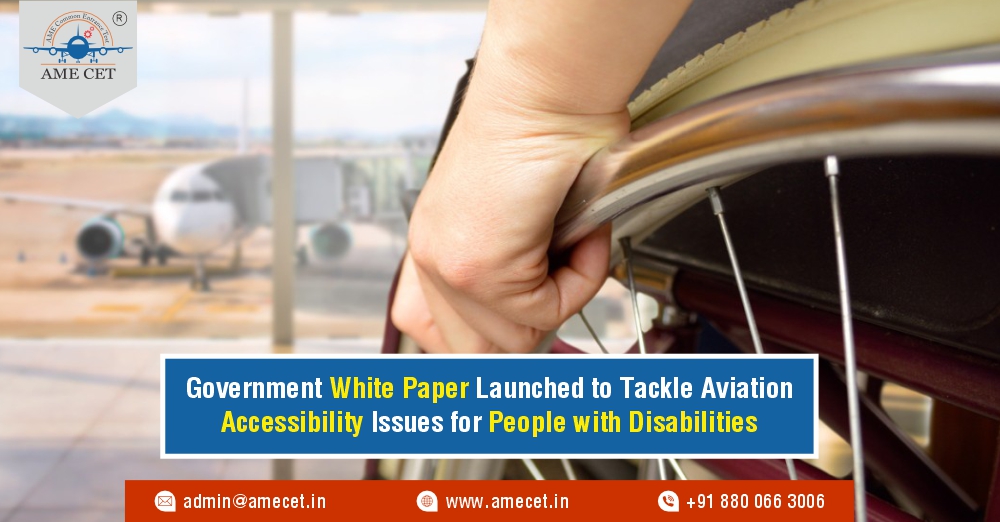
In a significant move toward inclusive aviation, the government has released a comprehensive white paper aimed at addressing the longstanding challenges faced by people with disabilities in air travel. This landmark document not only outlines strategies to enhance accessibility but also promises to create new job opportunities, thereby making a meaningful impact on both the aviation industry and the broader economy.
Addressing Accessibility Challenges
The white paper comes in response to persistent concerns raised by disability advocates and air travelers about the numerous obstacles faced by people with disabilities when navigating airports and flying. These issues range from inadequate infrastructure and lack of proper assistance to poor communication and insufficient training for airline staff.
Key Recommendations of the White Paper:
-
Infrastructure Improvements: The white paper outlines a framework for upgrading airport facilities to meet the highest accessibility standards. This includes the installation of tactile pathways, improved signage, and accessible restrooms. Airports will also be required to enhance their boarding and deplaning processes to accommodate passengers with mobility issues more efficiently.
-
Training Programs: A significant focus of the white paper is on improving staff training. Airlines and airport personnel will be mandated to undergo specialized training programs designed to equip them with the skills needed to assist passengers with disabilities effectively. This training will cover everything from handling mobility aids to providing clear communication and support throughout the travel experience.
-
Technology Enhancements: The white paper advocates for the adoption of advanced technologies to support disabled passengers. This includes the implementation of mobile apps that provide real-time information on accessibility features, as well as the use of assistive technologies such as automated wheelchair systems and voice-activated services.
-
Policy and Regulation Changes: To ensure compliance, the white paper proposes new regulations and standards for airlines and airports. These changes aim to create a more uniform approach to accessibility across the aviation industry and establish mechanisms for monitoring and enforcement.
Economic Impact and Job Creation
Beyond addressing accessibility issues, the white paper is expected to stimulate significant economic benefits, particularly through job creation. Several new roles will be created as a result of the implementation of the proposed measures:
-
Accessibility Consultants: As airports and airlines work to comply with the new standards, there will be a growing demand for accessibility consultants. These professionals will help design and implement accessibility features, conduct audits, and provide guidance on best practices. Their expertise will be crucial in ensuring that the enhancements meet regulatory requirements and genuinely improve the travel experience for disabled passengers.
-
Training Specialists: The need for specialized training programs will generate new job opportunities for training specialists and educators. These individuals will develop and deliver training modules for airline and airport staff, focusing on accessibility and disability awareness. Their role will be essential in driving cultural change within the aviation industry and fostering a more inclusive environment.
-
Technology Developers: The push for technological solutions to support disabled passengers will create jobs in the tech sector. Developers and engineers will be needed to create and maintain apps, assistive devices, and other technological innovations designed to enhance accessibility. This sectoral growth will not only support the aviation industry's accessibility goals but also drive technological advancement.
-
Customer Service Representatives: Enhanced customer service roles will emerge as airlines and airports expand their support teams to assist disabled passengers. These representatives will provide personalized assistance, manage special requests, and ensure a smoother travel experience for all passengers. Their presence will be a vital component of the improved accessibility framework.
Broader Economic Benefits
The white paper's focus on improving accessibility is expected to have broader economic benefits beyond job creation. By making air travel more inclusive, the aviation industry can attract a wider customer base, including the estimated 15% of the global population living with some form of disability. This increase in demand could lead to higher revenues for airlines and airports, contributing to overall economic growth.
Moreover, the emphasis on accessibility can position the aviation industry as a leader in social responsibility and inclusivity. This reputation can enhance brand loyalty and attract positive public attention, further boosting economic prospects.
Conclusion
The release of the government white paper represents a pivotal step in addressing the challenges faced by people with disabilities in air travel. By outlining clear strategies for improving accessibility and creating new job opportunities, the white paper not only aims to make air travel more inclusive but also supports economic growth through job creation and industry advancement. As the aviation industry moves forward with these initiatives, it is expected that the combined efforts will result in a more equitable and accessible travel experience for all
Category
-
Aircraft Maintenance Engineering (DGCA) (62)
-
(268)
-
Cabin Crew (1)
-
Aerospace Engineering (3)
-
Aeronautical Engineering (2)
-
Airport Management (5)
-
Aircraft Maintenance Engineering (EASA) (6)
-
Airport Ground Staff (1)
-
Commercial Pilot License(CPL) (51)
-
Aircraft Maintenance Engineering (BTech/BE) (1)
-
B.Sc. in Aviation (1)
-
AME CET (5)
